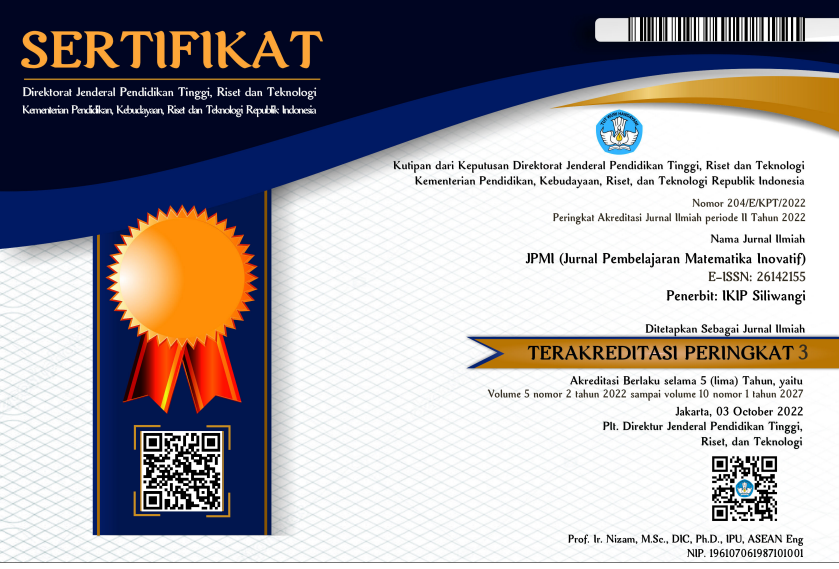ANALISIS PEMAHAMAN KONSEP MATEMATIS SISWA PADA PENERAPAN MODEL BLENDED LEARNING
DOI:
https://doi.org/10.22460/jpmi.v5i5.11208Keywords:
Ability to Understand Mathematical Concepts, Blended LearningAbstract
Students' ability to understand concepts is closely related to reasoning, communication, and problem solving skills. So a good understanding of concepts will help students achieve their learning goals well. This study aims to analyze and describe students' ability to understand mathematical concepts in the application of blended learning. The subjects in this study were class VIII students at SMPN 1 Sepatan, Kab. Tangerang. This type of research is descriptive qualitative. The procedures used in this study include the preparation, implementation, data analysis, and preparation stages. Data analysis techniques used in this study include Data Reductions, Data Display, and Conclusions. The results of this study there are differences in each indicator of the ability to understand students' mathematical concepts, not all indicators are met quite well. Blended learning has a good effect on the ability to understand students' mathematical concepts, this is due to face-to-face learning where students get a direct explanation of the material. This blended learning learning model is an effective and efficient learning in the implementation of distance learning.
References
Arcat. (2017). Pengaruh Model Pembelajaran Kooperatif Teknik Write-Pair-Squar Terhadap Kemampuan Pemahaman. Supremum Journal of Mathematics Education (SJME), 1(1), 1–6.
Asri, F. M., Ruslan, R., & Asdar, A. (2020). Deskripsi Pemahaman Konsep Matematika Siswa Ditinjau dari Intensitas Penggunaan E-Learning Quipper Video. Issues in Mathematics Education (IMED …, 3(2), 148–161. http://103.76.50.195/imed/article/view/11051
Asyrofi, M., Junaedi, I., & Artikel, I. (2016). Kemampuan Representasi Matematis Ditinjau Dari Multiple Intellingence Pada Pembelajaran Hybrid Learning Berbasis Konstruktivisme. Unnes Journal of Mathematics Education Research, 5(1), 32–39.
Diana, P., Marethi, I., & Pamungkas, A. S. (2020). Kemampuan Pemahaman Konsep Matematis Siswa: Ditinjau dari Kategori Kecemasan Matematik. SJME (Supremum Journal of Mathematics Education), 4(1), 24. https://doi.org/10.35706/sjme.v4i1.2033
Hadi, S., & Novaliyosi. (2019). TIMSS Indonesia (Trends in International Mathematics and Science Study). Prosiding Seminar Nasional & Call For Papers Program Studi Magister Pendidikan Matematika Universitas Siliwangi, 562–569. http://jurnal.unsil.ac.id/index.php/sncp/article/view/1096
Husni Idris. (2011). Pembelajaran Model Blended learning. Jurnal Iqra’ : Kajian Ilmu Pendidikan, 5(1), 61–73.
Khaerunnisa, F. (2020). Evaluasi Penerapan Blended Learning Pada Pembelajaran Bahasa Arab Di Smpit Ibadurrahman: Studi Kasus Di Kelas Vii Akhwat. ALSUNIYAT: Jurnal Penelitian Bahasa, Sastra, Dan Budaya Arab, 2(2), 95–108. https://doi.org/10.17509/alsuniyat.v2i2.24808
Nugraha, D. G. A. P., Astawa, I. W. P., & Ardana, I. M. (2019). Pengaruh model pembelajaran blended learning terhadap pemahaman konsep dan kelancaran prosedur matematis. Jurnal Riset Pendidikan Matematika, 6(1), 75–86. https://doi.org/10.21831/jrpm.v6i1.20074
Patmawati, S., Misdalina, M., & Fitriasari, P. (2019). Kemampuan Pemahaman Konsep Matematis Siswa Kelas X Melalui Model Blended Learning. HISTOGRAM: Jurnal Pendidikan Matematika, 3(2), 210. https://doi.org/10.31100/histogram.v3i2.412
Siahaan, M. (2020). Dampak Pandemi Covid-19 Terhadap Dunia Pendidikan. Jurnal Kajian Ilmiah, 1(1), 73–80. https://doi.org/10.31599/jki.v1i1.265
Sugiyono (2017). Metode Penelitian Kuantitatif, Kualitatif, dan R&D. Bandung : Alfabeta, CV.
Wardhani, S. (2008). Analisis SI dan SKL Mata Pelajaran Matematika SMP/MTs Untuk Optimalisasi Pencapaian Tujuan.
Widoyoko, E. P. (2018). Penilaian Hasil Pembelajaran Di Sekolah. Yogyakarta: Pustaka Pelajar

















